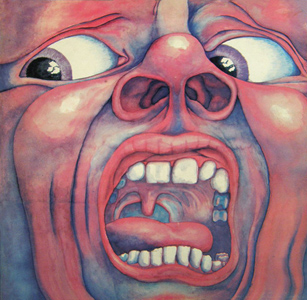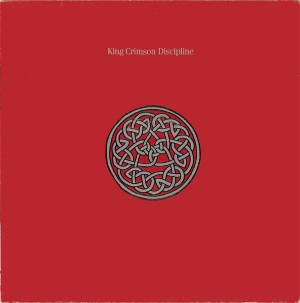Discipline Global Mobile
Last updated| Discipline Global Mobile | |
|---|---|
 | |
| Founded | 1992 England |
| Founder | Robert Fripp |
| Distributor(s) | MNRK Music Group |
| Location | Salisbury, England |
| Official website | dgmlive |
Discipline Global Mobile (DGM, or Discipline GM) is an independent record label founded in 1992 by Robert Fripp (best known as guitarist and main composer for the band King Crimson) and producer/online content developer David Singleton. [1] DGM has released solo music by Fripp as well as work by various affiliated musicians and bands including King Crimson, The Vicar, the California Guitar Trio and others. [2] The label has offices in Salisbury, England, and Los Angeles, California. [3]
Contents
- Foundation and business aims
- Artists and back catalogue
- Current/recent DGM artists
- Past DGM artists
- Mail-order and on-line services
- Conflict with Grooveshark
- See also
- Notes
- References
- Further reading
- External links
DGM has aimed to be "a model of ethical business in an industry founded on exploitation, oiled by deceit, riven with theft and fueled by greed," according to Fripp. [4] Its policy is that its artists retain all copyrights; consequently, even DGM's corporate logo is owned by its designer. [5] The label was an early adopter of the digital download system. DGM's aims have been hailed as "exemplary", and the label has been credited with having expanded "the possibilities of experimental music" and having improved the environment for King Crimson. [6]
The DGM label name is derived from the title of a 1981 King Crimson album ( Discipline ) and from the name of Singleton's previous recording business (The Mobile). The label logo also partly reflects the artwork for the Discipline album (featuring a new but similar knotwork commissioned from the artist Steve Ball). [7]
Foundation and business aims

Having been a professional musician since the mid-'60s (and the guitarist for King Crimson since 1969), by the late 1980s Robert Fripp found himself in conflict with his longtime record label E.G. Records and management company (E.G. Management) over royalties allegedly owed by E.G. to himself and to other band members. During this period, Fripp met and began working with producer and online developer David Singleton, initially on a Guitar Craft tour in 1990 and subsequently on the production of two albums - the League of Crafty Guitarists' Show of Hands and the eponymous album for the Fripp-and-Toyah-fronted group Sunday All Over the World. Fripp and Singleton's production partnership was sealed by work on two King Crimson boxed sets (1991's Frame by Frame and 1992's The Great Deceiver) and continues to the present day under the name of TonProb.
After seven years, Fripp and E.G. reached a settlement [8] [9] but the experience left Fripp determined to take control of his own work and financial affairs wherever possible. As part of this aim, he founded Discipline Global Mobile (DGM) as an independent music label in 1992, as a fifty-fifty partnership with Singleton. [10] [11] [12]
DGM's mission statement consists of five "DGM business aims", as follows:
- "The first aim of DGM is to help bring music into the world which would otherwise be unlikely to do so, or under conditions prejudicial to the music and / or musicians.", [13]
- "The second aim of DGM is to operate in the market place, while being free of the values of the market place."
- "The third aim of DGM is to help the artists and staff of DGM achieve what they wish for themselves."
- "The fourth aim of DGM is to find its audience."
- "The fifth aim of DGM is to be a model of ethical business in an industry founded on exploitation, oiled by deceit, riven with theft and fueled by greed." [4] [8] [13] [14]

These aims were called "exemplary" by Bill Martin, who wrote that "Fripp has done something very important for the possibilities of experimental music" in creating DGM, and that DGM "has played a major role in creating favorable conditions for" King Crimson. [6]
Since at least the early 1960s, the recording industry has required artists to sign over copyrights and moral rights to their cover art, music, and lyrics. DGM rejects this practice, and since its 1992 founding has maintained its policy that its artists retain the copyrights and the moral rights to their works, [8] [14] be those works musical or visual art. [12] Fripp wrote,
"The phonographic copyright in these performances is operated by Discipline Global Mobile on behalf of the artists, with whom it resides, contrary to common practice in the record industry. Discipline accepts no reason for artists to assign the copyright interests in their work to either record company or management by virtue of a 'common practice' which was always questionable, often improper, and is now indefensible." [16]
This extends even to DGM's knotwork corporate logo, the copyright of which is owned not by the company, but by its designer, [5] Steve Ball. [17] [18] [19] [20]
DGM does not require that its artists sign written contracts. [21] Former Led Zeppelin bassist John Paul Jones said, "It's pure trust," and noted that "there are dangers on both sides. I could have a successful album and just sign with a major, or they could decide not to pay me." Jones explained that he was accustomed to "working in situations that do rely on trust and integrity, those old-fashioned words" because Led Zeppelin had no contract with its manager. [11] [15] Another DGM band, alternative rock group The Rosenbergs, opted to work with the label following conflicts with their previous label Universal Records, which had even demanded control of the band's domain name: in contrast, DGM had encouraged them to retain control of their own master recordings and provided them with funds for touring and promoting their album. [22]
Royalties are paid above the prevailing rate, as announced at DGM's launch. [8] In return, DGM artists are responsible for promoting their albums through concert tours and interviews. [14]
Artists and back catalogue

Discipline Global Mobile specializes in art rock, progressive rock, jazz, and assorted experimental and crossover music (the label has also released recordings of Renaissance lute music and mainstream alternative rock). DGM has released more than a hundred King Crimson recordings, including remastered albums with bonus tracks and DVDs with archival footage. In addition to King Crimson, DGM's current active roster includes assorted Robert Fripp projects and The Vicar (a songwriter project). [23] The label has previously released music by various Fripp-affiliated ensembles; The League of Crafty Guitarists, Les Gauchos Allemagnes, the California Guitar Trio and the Robert Fripp String Quartet (all of which stem from or are connected with Fripp's Guitar Craft courses) [11] [24]
Current/recent DGM artists
- King Crimson (over 100 releases of archive material and additional releases outside of current major-label product)
- The ProjeKcts (King Crimson subgroups)
- Robert Fripp (solo releases, Soundscape recordings)
- Fripp & Eno
- The Vicar
- David Sylvian & Robert Fripp (reissues)
- Jakszyk, Fripp & Collins
Past DGM artists
- Adrian Belew
- BPM&M
- Bill Bruford (with Ralph Towner & Eddie Gomez)
- Bill Bruford's Earthworks
- Bruford Levin Upper Extremities
- California Guitar Trio
- Europa String Choir
- Robert Fripp String Quintet
- Tony Geballe
- Gitbox
- Trey Gunn
- Peter Hammill
- Steve Hancoff
- Jacob Heringman
- John Paul Jones
- Tony Levin
- Los Gauchos Alemanes
- Mr McFall's Chamber
- Bill Nelson
- Opus 20
- Juan Carlos Quintero
- The Rosenbergs
- Ten Seconds
Mail-order and on-line services
According to a 1998 profile in Billboard magazine, Discipline Global Mobile had seven staff members in Salisbury, England, and three in Los Angeles, California. [11] DGM "is actually housed in a dull pebbledash building in a village near Salisbury, south-west England". [10]
Its label manager reported that the country with the largest market was Japan, where mail-orders accounted for only 10% of sales, but 50% of profits. In 1998, DGM was distributed in Japan by Pony Canyon; in the United Kingdom by Pinnacle; [11] and in the United States by Rykodisc. [11] [22] Sound samples have been offered in addition to DGM's mail-order services. [11] Free downloads from DGM have strengthened the relations between artists and fans. [14]
In 2012, DGM's site had the following introduction: "The aim of DGM is to connect music, musician and audience in a way that supports the power of music, the integrity of the musician and the needs of the audience. DGM Live offers music for download with photographs, diary archives and audience commentary for browsing". [25] DGM's successful transition to an age of digital distribution was called "unique" among music labels in 2009; this success was credited to its provision of legal, high-quality recordings of concerts, which effectively reverse-engineered the distribution-networks for unlicensed recordings ("bootlegs") of concerts. [26]
DGM publishes on-line diaries by Robert Fripp and David Singleton. [27] A moderated forum allows fans to ask questions or to leave comments. Together, the diaries and the fan forum display delayed dialogs in which the artists and fans discuss diary-entries and forum-postings. Fripp's public writing of his diary has challenged his readers to become more active listeners and intelligent participants in performances of music. [28]
Conflict with Grooveshark
Fripp's diaries were internationally discussed following his publication of documents from a dispute with Grooveshark, an on-line distributor of music. Fripp and Singleton complained that Grooveshark had been continuing to distribute his music, even after repeated takedown notices and other complaints. Their correspondence with Grooveshark was published by Digital Music News [29] [30] [31] and in his DGM diary. [32] Fripp's exchange with Grooveshark was included in a suit against Grooveshark by Universal Music Group, which was filed in November 2011. [29] [33]
See also
- List of record labels
- P. J. Crook (Painter owning copyrights to album covers)
Notes
- ↑ "The Wire". August 2014.
- ↑ About DGMLive. "Statement at foot of homepage".
- ↑ Billboard, 1998
- 1 2 3 Fripp (1998 , p. 9) according to Bruns (2003 , p. 3)
- 1 2 Fripp (1998a , p. 3)
- 1 2 Martin (1997 , p. 269 )
- ↑ Discipline Global Mobile - Ball Diary 13
- 1 2 3 4 Bambarger (1998 , p. 86)
- ↑ Bruford (2009 , p. 142 )
- 1 2 Hunter-Tilney, Ludovic (3 August 2012). "The day the music died: In a rare interview, prog rock legend Robert Fripp speaks about standing up to the music industry". The Financial Times. Event occurs at 7:27 pm. Retrieved 5 August 2012.
- 1 2 3 4 5 6 7 Bambarger (1998)
- 1 2 Atton (2001 , p. 39)
- 1 2 "About DGM: DGM business aims". Discipline Global Mobile. Archived from the original on 2 March 2012. Retrieved 25 March 2012.
- 1 2 3 4 Atton (2004 , Chapter 6 "Fan culture and the Internet: Musicians and fanzines", p. 153 )
- 1 2 Shepherd, Fiona (1999). "Recognise the face of bass? (Clue: Think Led Zeppelin)". The Scotsman . ECM Publishers, Inc. Archived from the original on 11 June 2014. Retrieved 14 April 2012.
- ↑ Kozar (2012 , "Fripp's aim was to move his music in new directions that others did not always understand", p. 2 )
- ↑ Ball, Steve (1 October 2001). "Saturday September 29". Steve Ball diary. Steve Ball. Retrieved 25 March 2012.
Ball (2001) cites as the original inspiration for the first cover for Discipline a design by Bain (1973 , "Pictish knotwork borders from Gospels of Lindifarme and Book of Kells", p. 40 ): Bain, George (1973) [1951]. Celtic art: The methods of construction (Reprint of Constable Press ed.). Mineola, New York: Dover Publications. ISBN 0-486-22923-8.
- ↑ Ball, Steve (21 May 2009). "Steve Ball extended history". Steve Ball Roadshow. Steve Ball. Retrieved 25 March 2012.
- ↑ Fripp, Robert (22 August 1999). "Robert Fripp's Diary - 22 August 1999". Discipline Global Mobile. Retrieved 25 March 2012.
Steve Ball is ... designer of the [League of Crafty Guitarists] & Discipline knotworks (among others in which he holds the copyright)
- ↑ Hegarty & Halliwell (2011 , "Illustration credits: Chapter 9", p. xii )
- ↑ Mehle, Michael (22 October 1999). "Been a long time: John Paul Jones hitting the road 19 years after Zeppelin's demise". Rocky Mountain News. Denver, CO. Archived from the original on 29 March 2015. Retrieved 14 April 2012.
- 1 2 Spellman (2002 , p. 87 ))
- ↑ Cook, Richard (1 January 1996). "In praise of older men". New Statesman. New Statesman Ltd. Archived from the original on 21 September 2014. Retrieved 14 April 2012.
- ↑ Molenda, Michael (1 January 2000). "California Guitar Trio: Paul Richards, Bert Lams, Hideyo Moriya" . Guitar Player. NewBay Media LLC. Retrieved 14 April 2012.
- ↑ "Welcome to DGM Live". Discipline Global Mobile. Retrieved 25 March 2012.
- ↑ Anonymous (18 August 2009). "Jam and the joys of music distribution in today's world". Belfast Telegraph. Independent News and Media PLC. Archived from the original on 23 May 2013. Retrieved 14 April 2012.
- ↑ "Word". DGM Live. Retrieved 24 August 2019.
- ↑ Atton (2001 , p. 43)
- 1 2 Sisario, Ben (14 December 2011). "Sony and Warner are said to sue web music service". New York Times. Retrieved 30 May 2012.
- ↑ Peoples, Glenn (21 November 2011). "Grooveshark Lawsuit Reveals Details of Universal Music Group's Allegations". billboard.com. Retrieved 5 February 2021.
- ↑ Abonalla, Rochell (13 October 2011). "King Crimson Can't Get Their Music Off of Grooveshark. So They cc'd Digital Music News…". Digital Music News . Retrieved 1 February 2021.
- ↑ Smith, Sid (1 May 2015). "Going, Going, Grooveshark Gone". dgmlive.com. Retrieved 22 March 2021.
- ↑ Lawsuit claims Grooveshark workers posted 100,000 pirated songs. Greg Sandoval, CNET, 21 November 2011
Related Research Articles

King Crimson were an English progressive rock band formed in 1968 in London. The band drew inspiration from a wide variety of music, incorporating elements of classical, jazz, folk, heavy metal, gamelan, industrial, electronic, experimental music and new wave. They exerted a strong influence on the early 1970s progressive rock movement, including on contemporaries such as Yes and Genesis, and continue to inspire subsequent generations of artists across multiple genres. The band earned a large cult following.

Robert Fripp is an English musician, songwriter, record producer, and author, best known as the guitarist, founder and longest-lasting member of the progressive rock band King Crimson. He has worked extensively as a session musician and collaborator, notably with David Bowie, Blondie, Brian Eno, Peter Gabriel, Daryl Hall, Midge Ure, Talking Heads, and David Sylvian. He also composed the startup sound of Windows Vista operating system, in collaboration with Tucker Martine and Steve Ball. His discography includes contributions to over 700 official releases.

In the Court of the Crimson King is the debut studio album by English progressive rock band King Crimson, released on 10 October 1969 by Island Records. The album is one of the earliest and most influential of the progressive rock genre, where the band combined the musical influences that rock music was founded upon with elements of jazz, classical, and symphonic music.

Beat is the ninth studio album by the British rock band King Crimson, released in 1982 by record label E.G. This is the second King Crimson album to feature the band's line-up of co-founder Robert Fripp, Adrian Belew, Tony Levin and Bill Bruford. It is the first release in King Crimson’s discography to feature the same lineup as the previous studio album.

The Construkction of Light is the twelfth studio album by English band King Crimson, released in May 2000 by record label Virgin. It is the first of two studio albums to feature the “double duo” line-up of Robert Fripp, Adrian Belew, Trey Gunn and Pat Mastelotto. It is the only King Crimson studio album to not chart in the US.

Discipline is the eighth studio album by English progressive rock band King Crimson, released on 22 September 1981 by E.G. Records in the United Kingdom and by Warner Bros. Records in the United States.

Red is the seventh studio album by English progressive rock band King Crimson. It was released on 1 October 1974 through Island Records in the United Kingdom and Atlantic Records in North America and Japan. The album was recorded at Olympic Studios in London in July and August 1974, and produced by the band themselves. The track "Providence" was a free improvisation recorded at their 30 June 1974 concert at the Palace Theater in the city of the same name. Parts of some of the pieces were conceived during previous improvisations performed by the band live. "Starless" was originally considered for their previous album, Starless and Bible Black (1974), but was deemed incomplete at the time. The lengthy version included on this album was refined and performed during concerts throughout 1974.

Absent Lovers: Live in Montreal is a live album by the band King Crimson, recorded 11 July 1984, and released in 1998. This was taken from the final night of their 1984 tour and would subsequently be King Crimson's last performance until the warm-up shows in Argentina ten years later for the later-to-be-released album THRAK.

The Night Watch is a live album by the English rock band King Crimson, recorded in Amsterdam in 1973, and released in 1997.

"Matte Kudasai" literally "Wait, Please" in Japanese, is a ballad by the progressive rock band King Crimson. Featuring vocals by Adrian Belew, it was released as the first single from the album Discipline (1981). In the UK, the single just missed the chart.
Pamela June Crook, known professionally as P J Crook, is an English painter and sculptor. Her shows have appeared in London, France, the United States, Japan, Canada, and Estonia. Her professional name "P J Crook" lacks full stops; variant stylings such as "P. J. Crook" have appeared.

New standard tuning (NST) is an alternative tuning for the guitar that approximates all-fifths tuning. The guitar's strings are assigned the notes C2-G2-D3-A3-E4-G4 ; the five lowest open strings are each tuned to an interval of a perfect fifth {(C,G),(G,D),(D,A),(A,E)}; the two highest strings are a minor third apart (E,G).

Guitar Craft (GC) was a series of guitar and personal-development classes, founded and often presented by Robert Fripp, who is best known for his work with the rock band King Crimson. Guitar Craft courses introduced students to new standard tuning and ergonomic playing with the plectrum (pick), often using steel-stringed, acoustic, shallow-body guitars from the Ovation Guitar Company.

The discography of King Crimson consists of 13 studio albums, 15 live albums, 13 compilation albums, 3 extended plays, 10 singles, 6 video albums and 9 major box sets.
E.G. Records was a British artist management company and independent record label, mostly active during the 1970s and 1980s. The initials stood for its founders, David Enthoven and John Gaydon.
The ProjeKcts are a succession of spin-off projects associated with the band King Crimson.

"Larks' Tongues in Aspic" is a musical suite by the English progressive rock band King Crimson. Spanning thirty years and four albums, the series comprises five parts, all of which carry unifying musical motifs. Parts I and II were released as the introductory and final tracks on King Crimson's 1973 album of the same name, part III was featured on their 1984 album Three of a Perfect Pair, part IV appeared on 2000's The Construkction of Light, and the final part, "Level Five", was included on the 2003 album The Power to Believe. Despite breaking the naming convention, Robert Fripp, King Crimson founder and only constant contributor to the suite, insists that "Level Five" is part of the pentalogy.
David Singleton is an English record producer, audio engineer, record label director, musician, songwriter, author and Internet entrepreneur. He is best known as the production and business partner of Robert Fripp of King Crimson.

The Vicar is a persona and multimedia project created by record producer, songwriter and Internet entrepreneur David Singleton. Since 2001, the project has produced music, a public diary, fictional stories and several culture-jamming initiatives.
References
- Anonymous, Billboard (5 March 2002). "Zeppelin's John Paul Jones brings the 'thunder'". Billboard . Billboard.com.
- Atton, Chris (2001). "'Living in the Past'?: Value discourses in progressive rock fanzines". Popular Music. Cambridge University Press. 20 (1): 29–46. doi:10.1017/S0261143001001295. JSTOR 853693. S2CID 191358373.
- Atton, Chris (2004). An alternative Internet. Edinburgh University Press. pp. 138–154 and 107. ISBN 978-0-7486-1770-8 . Retrieved 25 March 2012.
- Bambarger, Bradley (11 July 1998). "Fripp label does it his way: Guitarist follows own muse in business, too". Billboard. Vol. 110, no. 28. pp. 13 and 86.
- Bruford, Bill (2009). Bill Bruford: The autobiography: Yes, King Crimson, Earthworks, and more. Jawbone Press. ISBN 978-1-906002-23-7.
- Bruns, Axel (2003). "Fight for survival: The RIAA's sustained attack on streaming media" (PDF). M/C: A Journal of Media and Culture. 6 (1): 1–6. "RIAA" abbreviates "Recording Industry Association of America".
- Fripp, Robert (1998). "Discipline Global Mobile: A small, mobile and independent record company". Space Groove (CD booklet). ProjeKct Two. Discipline Global Mobile. pp. 9–10. Space Groove at AllMusic. Retrieved 25 March 2012. sku DGM9801. Cited by Bruns (2003, p. 3).
- Fripp, Robert (1998a). "CD booklet". Absent Lovers: Live in Montreal (Liner notes). King Crimson. Discipline Global Mobile. pp. 3 and 17. Absent Lovers at AllMusic. Retrieved 25 March 2012. sku DGM9804.
- Hegarty, Paul; Halliwell, Martin (25 August 2011). Beyond and before: Progressive rock since the 1960s. Continuum. pp. xii+328. ISBN 978-0-8264-4075-4.
- Kozar, Ron (23 March 2012). "Robert Fripp: An appreciation". Pop Matters . No. RiskTakers. Retrieved 12 April 2012.
- Martin, Bill (1997). Listening to the future: The time of progressive rock, 1968–1978. Open Court. p. 376. ISBN 0-8126-9368-X.
- Spellman, Peter (2002). "8 Signing a deal with off-line and on-line record labels". The musician's Internet: On-line strategies for success in the music industry. Berklee Guide, and Music business. Berklee Press, and Hal Leonard Corporation. p. 124. ISBN 978-0-634-03586-9. LCCN 2002283637 . Retrieved 25 March 2012.
- Tamm, Eric (2003) [1990]. "9 King Crimson IV and Andy Summers: 'Discipline: The band' and 'King Crimson born again'". Robert Fripp: From crimson king to crafty master (Progressive Ears ed.). Faber and Faber (1990). ISBN 0-571-16289-4. Zipped Microsoft Word Document . Retrieved 25 March 2012.
Further reading
- Fripp, Robert (January 1980). "The new realism: A musical manifesto for the 80s". Musician, Player and Listener. 22: 34. Cited in Tamm (2003).
- Fripp, Robert (April–May 1980). "The vinyl solution". Musician, Player and Listener. 24: 24. Cited in Tamm (2003).
- Fripp, Robert (April–May 1981). "Bootlegging, royalties, and the moment". Musician, Player and Listener. 32: 28. Cited in Tamm (2003).
- Kirk, Cynthia (8 August 1979). "Fripp 'anti-tour' unconventional, but artist says it proves point". Variety. 296: 59. Cited in Tamm (2003).
- Schruers, Fred (26 July 1979). "Robert Fripp's public Exposure: The return to 'an intelligent way of listening'". Rolling Stone. Vol. 296. p. 16. Cited in Tamm (2003).
- Smith, Sid (2001). In the court of King Crimson. Helter Skelter Publishing. ISBN 1-900924-26-9.
External links
- Anonymous, DGM Live! (2012). "Welcome to DGM Live". Discipline Global Mobile. Retrieved 25 March 2012.
- Ball, Steve (21 December 2010). "steveball.com—the official steve ball website". steveball.com. Retrieved 25 March 2012.